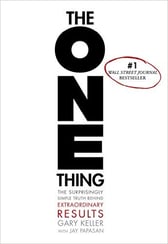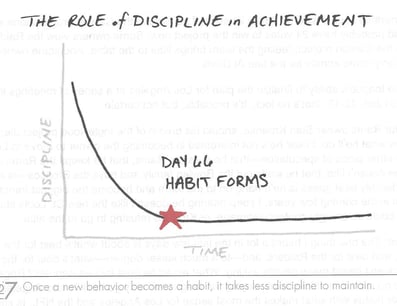Do you recognize this person?
 From the book The ONE Thing: The Surprisingly Simple Truth Behind Extraordinary Results by Gary Keller with Jay Papasan:
From the book The ONE Thing: The Surprisingly Simple Truth Behind Extraordinary Results by Gary Keller with Jay Papasan:
Diagnosed with ADHD as a child, his kindergarten teacher told his mother, “Michael can’t sit still. Michael can’t be quiet... . He’s not gifted. Your son will never be able to focus on anything.” Bob Bowman, his coach since age 11, reports that Michael spent a lot of time on the side of the pool by the lifeguard stand for disruptive behavior. That same misbehavior has cropped up from time to time in his adult life as well. Yet, he’s set dozens of world records. In 2004 he won six gold and two bronze medals in Athens and then, in 2008, a record eight in Beijing, surpassing the legendary Mark Spitz. His 18 gold medals set a record for Olympians in any sport. Before he hung up his goggles in retirement, his wins at the 2012 London Olympic Games brought his total medal count to 22 and earned him the status of most-decorated Olympian in any sport in history.
Talking about (Mr. Undisciplined), one reporter said, “If he were a country he’d be ranked 12th over the last three Olympics.” Today, his mom reports, “Michael’s ability to focus amazes me.” Bowman calls it “his strongest attribute.” How did this happen? How did the boy who would “never be able to focus on anything” achieve so much? (Mr. Undiscipline) became a person of selected discipline. From age 14 through the Beijing Olympics, he trained seven days a week, 365 days a year. He figured that by training on Sundays he got a 52-training-day advantage on the competition. He spent up to six hours in the water each day. “Channeling his energy is one of his great strengths,” said Bowman. Not to oversimplify, but it’s not a stretch to say that (Mr. Undisciplined), channeled all of his energy into one discipline that developed into one habit—swimming daily.
Mr. Undisciplined is of course - Michael Phelps.
Disciplined Success?
The trick to success is to choose the right habit and bring just enough discipline to establish it.
Do you believe the successful person is the “disciplined person” who leads a “disciplined life.”
It’s a lie.
We actually don’t need any more discipline than we already have. What we need to direct and manage it better.
Success is not a marathon of disciplined action. It doesn’t require you to be a full time disciplinarian. Success is a short race—a sprint fueled by discipline just long enough for habit to kick in and take over.
When we know something that needs to be done but isn’t currently getting done, we often say, “I just need more discipline.” What we need is the habit of doing it. We need just enough discipline to build the habit.
Are we confounding habit and discipline?
The One Thing explains: In a discussion about success, the words “discipline” and “habit” ultimately intersect. Though separate in meaning, they powerfully connect to form the foundation for achievement—regularly working at something until it regularly works for you. When you discipline yourself, you’re essentially training yourself to act in a specific way. Stay with this long enough and it becomes routine—in other words, a habit. So when you see people who look like “disciplined” people, what you’re really seeing is people who’ve trained a handful of habits into their lives. This makes them seem “disciplined” when actually they’re not. No one is.
The Reality: You don’t need to be a disciplined person to be successful. As the example of my customer and Michael Phelps shows: you can become successful with less discipline than you think, for one simple reason: success is about doing the right thing, not about doing everything right.
How Long to Develop A Habit?
Habits are hard in the beginning. Over time, the habit you’re after becomes easier and easier to sustain. Think of the habit of brushing your teeth for example. I’m betting you don’t even need to think about it. It’s automatic. The truth is habits require much less energy and effort to maintain than to begin (see Illustration). If you are able to put up with the discipline long enough to turn it into a habit, then the journey feels much different.
(see Illustration). If you are able to put up with the discipline long enough to turn it into a habit, then the journey feels much different.
Tom Hopkins a sales training guru in the 1980’s always preached, “do the things you fear and the death of fear is certain.” This is true especially with a sales person learning to make cold calls. This one habit, the ability to make cold calls, done consistently and proficiently can vault any sales person to the top of his profession.
The hard stuff becomes habit, and habit makes the hard stuff easy. Once a new behavior becomes a habit, it takes less discipline to maintain.
How long do you have to maintain discipline? Again from the book The One Thing: Researchers at the University College of London have the answer. In 2009, they asked the question: How long does it take to establish a new habit? They were looking for the moment when a new behavior becomes automatic or ingrained. The point of “automaticity” came when participants were 95 percent through the power curve and the effort needed to sustain it was about as low as it would get. They asked students to take on exercise and diet goals for a period of time and monitor their progress. The results suggest that it takes an average of 66 days to acquire a new habit. The full range was 18 to 254 days, but the 66 days represented a sweet spot—with easier behaviors taking fewer days on average and tough ones taking longer. Self-help circles tend to preach that it takes 21 days to make a change, but modem science doesn’t back that up. It takes time to develop the right habit, so don’t give up too soon. Decide what the right one is, then give yourself all the time you need and apply all the discipline you can summon to develop it.
Here’s the additional beauty in creating a habit. Australian researchers Megan Oaten and Ken Cheng found evidence of a halo effect around habit creation. In their studies, students who successfully acquired one positive habit reported less stress; less impulsive spending; better dietary habits; decreased alcohol, tobacco, and caffeine consumption; fewer hours watching TV; and even fewer dirty dishes. (Wow Huh?) Sustain the discipline long enough on one habit, and not only does it become easier, but so do other things as well. If you wonder why those with the right habits seem to do better than others, this is the explanation. They’re doing the most important thing regularly and, as a result, everything else is easier.
BIG IDEAS from Myth of Self-Discipline
- Don’t be a disciplined person. Be a person of powerful habits and use selected discipline to develop them.
- Build one habit at a time. Success is sequential, not simultaneous. No one actually has the discipline to acquire more than one powerful new habit at a time. Super-successful people aren’t superhuman at all; they’ve just used selected discipline to develop a few significant habits. One at a time. Over time.
- Give each habit enough time. Stick with the discipline long enough for it to become routine. Habits, on average, take 66 days to form. Once a habit is solidly established, you can either build on that habit or, if appropriate, build another one.
Do you recall the Greek mythology story of Odysseus asking his crew to bind him to his ship’s mast while sailing by the dangerous but beautiful Sirens? Where there’s a will there’s a way is an old English proverb that is simply another lie. We’ll explore this next blog.






.jpeg?width=150&height=135&name=Hand%20with%20marker%20writing%20the%20question%20Whats%20Next_%20(1).jpeg)

